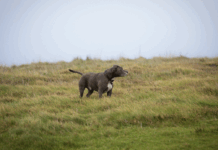Last Updated on September 24, 2023 by Dogs Vets
The Social behavior of Rottweiler Dogs
The Rottweiler is a very intelligent dog, courageous with a lot of energy. It’s also powerful and strong, but it has a gentle temperament. They are very protective of their owners and will do anything to keep them safe.
Rottweilers are known for their robust and confident personality. They are naturally protective and can be reserved around strangers, but they are also very loving and loyal to their families.
They are often described as intelligent dogs that are eager to work and have a strong desire to please their owners.
Rottweilers are a popular breed of dog known for their intelligence, strength, and loyalty. They are also known for their social behavior, which can be complex and nuanced.
In this article, we will explore the social behavior of Rottweilers in detail, discussing their interactions with humans, other dogs, and other animals.
Rottweilers and Humans
Rottweilers are known for their strong bonds with their human companions. They are loyal and protective dogs, and they often crave attention and affection.
Rottweilers can also be very playful and affectionate, and they enjoy spending time with their families.
However, it is important to note that Rottweilers are also large and powerful dogs. They require proper training and socialization from a young age in order to ensure that they are well-behaved and predictable around humans.
Rottweilers should also be supervised around children, as they may accidentally knock them over or injure them during play.
Rottweilers and Other Dogs
Rottweilers can be social with other dogs, but they can also be dominant and aggressive. It is important to introduce Rottweilers to other dogs slowly and carefully, and to supervise their interactions closely.
Rottweilers may be more likely to be aggressive towards other dogs of the same sex, especially if they are not properly socialized.
If you have a Rottweiler, it is important to train them to obey basic commands and to be respectful of other dogs.
You should also avoid taking your Rottweiler to dog parks or other places where there are many other dogs, unless you are confident that your dog will be well-behaved.
Rottweilers and Other Animals
Rottweilers may be aggressive towards other animals, such as cats and small animals. This is because Rottweilers were originally bred to be herding and guard dogs, and they have a natural instinct to protect their territory and possessions.
If you have a Rottweiler, it is important to supervise their interactions with other animals closely. You should also train your Rottweiler to leave other animals alone and to come when called.
Tips for Socializing Your Rottweiler
Socialization is essential for Rottweilers. It helps them to learn how to interact with other dogs, humans, and other animals in a positive way. Here are a few tips for socializing your Rottweiler:
- Start socializing your Rottweiler at a young age. The earlier you start socializing your dog, the easier it will be for them to learn how to interact with others in a positive way.
- Introduce your Rottweiler to new people, dogs, and animals gradually. Don’t overwhelm them with too much new stimuli at once.
- Reward your Rottweiler for positive interactions with other dogs, people, and animals. This will help them to learn that good behavior is rewarded.
- Enroll your Rottweiler in puppy kindergarten or obedience classes. This is a great way for your dog to learn basic commands and to socialize with other dogs in a safe and controlled environment.
So if you’re interested in getting a Rottweiler then I can assure you that they are definitely worth the time and effort!
Myths and misunderstandings about the Rottweiler Dog
As a breed, the Rottweiler is misunderstood. There are many myths about rottweiler dogs that are not true. The truth about your Rottweiler will help you to understand them better and be able to live happily with your pet dog.
Here are some common misconceptions:
The Rottweiler is highly intelligent.
The Rottweiler dog is highly intelligent. In fact, it’s one of the most smartest dog breeds, and it can learn tricks faster than most regular guard dogs.
This makes them easier to train than other breeds that require less effort on your part in order to teach them new skills or behaviors.
They’re also very loyal to their owners and protective of them; this means that they may not be good candidates for homes with families who are unable or unwilling to provide adequate supervision while the dog is at home alone throughout the day or night hours (especially when left unattended in an unfamiliar environment).
Despite their large size, Rottweilers are quite easy to train.
Despite their large size, Rottweilers are quite easy to train. They have a naturally high intelligence and are eager learners who respond well to positive reinforcement.
Praise, rewards and petting your dog can help you train your dog faster than with other breeds.
Yes, they’re powerful, but they are also gentle.
A Rottweiler is a powerful dog, but they are also gentle. Yes, they have a high pain threshold and can be protective of their families, but they are not aggressive or violent by nature.
They love children and can be good with them as long as you train them from a young age to know when to pull back on their eagerness to play with kids who aren’t always ready for it (or at all).
They behave perfectly around children.
Rottweilers are very sweet and loving dogs. They have an excellent temperament towards children, and they will do anything for a child.
If you have a Rottie, it means that you are also living with someone who is protective of your loved ones and property.
This breed can be known as one of the most patient breeds in the world because they don’t show any signs of aggression even when they get teased by other dogs or people around them at home or outside their yard!
They are great with strangers too since they never show any signs of aggression towards other animals or humans who come into contact with them through accident or otherwise…
7 Thing you need to know about Rottweilers
Rottweilers are known for their robust and confident personality. They are naturally protective and can be reserved around strangers, but they are also very loving and loyal to their families.
They are often described as intelligent dogs that are eager to work and have a strong desire to please their owners.
- Temperament: Rottweilers are generally calm and confident dogs. They are known for their stoic demeanor and can be quite reserved, especially around people they do not know. However, once they get to know and trust someone, they can be very affectionate and playful.
- Intelligence: Rottweilers are among the top most intelligent dog breeds. They are quick learners and can be trained to perform a variety of tasks, from basic obedience to advanced tricks and commands. This intelligence combined with their working heritage means they require plenty of mental stimulation to keep them happy and prevent boredom.
- Protectiveness: Rottweilers are naturally protective dogs. This trait makes them excellent guard dogs, but it also means they need careful socialization and training to ensure they do not become overly protective or aggressive. A well-socialized Rottweiler should be confident and not unnecessarily aggressive.
- Affectionate with Family: Rottweilers are very affectionate with their families and can be great with children if properly trained and socialized. They enjoy being part of the family and can be quite “clingy” with their owners. They are known for being very loyal and forming strong bonds with their families.
- Interaction with other dogs: As with any breed, individual Rottweilers will have their own personalities and temperaments, and this includes how they interact with other dogs. Some Rottweilers get along well with other dogs, while others may be more aloof or even aggressive. Early socialization with other dogs and animals can help to ensure that a Rottweiler grows up to be well-rounded and comfortable in a variety of situations.
- Exercise Needs: Rottweilers are active and energetic dogs that need regular exercise to keep them fit and healthy. This can include walks, playtime in the yard, or structured activities like agility or obedience training. Without enough exercise, Rottweilers can become bored and destructive.
Remember, the behavior of a dog can depend heavily on its upbringing, training, and socialization. A well-trained, well-socialized Rottweiler can be a loyal, loving, and protective member of the family.
The rottweiler is the perfect companion.
The rottweiler is a great companion. It’s friendly and playful, but also has the intelligence to form bonds with its owner.
The rottweiler is a great family dog because it can adapt to any situation, and will not be left alone for long periods of time if you have other pets in your home.
The rottweiler is also an excellent guard dog—it will bark at noises outside the house or yard, alerting you of any potential threats that may be lurking nearby.
In addition to being protective towards people and property, the rottweiler loves playing with children (and adults) alike!
Conclusion
The Rottweiler is a powerful and versatile breed. They’re highly intelligent, but they can be trained to behave without a leash or collar.
Rottweilers are complex and social creatures. They can be loving and loyal companions, but they can also be dominant and aggressive.
It is important to understand the social behavior of Rottweilers in order to ensure that they are well-behaved and predictable around humans, other dogs, and other animals.
Their large size makes them an intimidating presence in the home, but they’re also gentle with children and other pets. The rottweiler is the perfect companion for any family!
FAQs
-
What are the common behaviors exhibited by Rottweilers?
Rottweilers are known for their loyalty, protectiveness, and intelligence. They can be strong-willed and confident, making them excellent guard dogs. However, they can also be affectionate and playful, particularly with their families.
-
Which dog breeds make the ideal companions for Rottweilers?
The best companion dog for a Rottweiler is one with a similar energy level and temperament. Some suitable breeds include Labrador Retrievers, Boxers, and German Shepherds. However, the compatibility of individual dogs is more important than their breed, so proper socialization and introduction are essential.
-
Do Rottweilers enjoy the company of other dogs and people?
Rottweilers can be social dogs if they are properly socialized from a young age. They can get along well with other dogs, animals, and people, but early and continuous exposure to various situations is crucial for developing their social skills.
-
In what ways do Rottweilers express their affection towards their owners?
Rottweilers show affection through physical touch, such as leaning against their owners, nuzzling, or licking. They may also follow their owners around the house, wag their tails, and engage in playful behavior to demonstrate their love and attachment.
-
Is it true that Rottweilers form a bond exclusively with one person?
While Rottweilers are known to be loyal and may develop a strong bond with one person, they are also capable of forming connections with multiple family members. However, the strength of the bond can vary depending on the time and effort each person invests in building a relationship with the dog.
-
Do Rottweilers exhibit clingy behavior towards their owners?
Rottweilers may be perceived as clingy due to their loyalty and protectiveness. They often enjoy being close to their owners and can follow them around the house. However, this behavior is not necessarily negative and can be managed through proper training and socialization.
Facts Check
We hope you enjoyed this article… What are your thoughts?
Please feel free to share this article!























